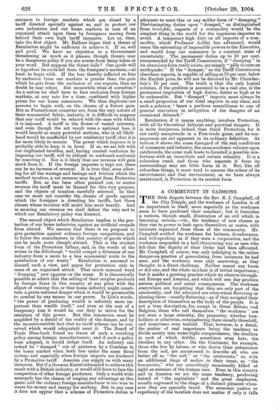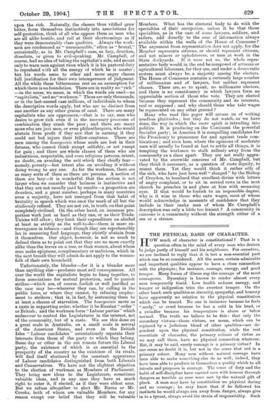T HE little dispute between the Rev. R. J. Campbell, of
the City Temple, and the workmen of London is of no importance in itself, more especially as the workmen seem to have pardoned their assailant ; but it furnishes a curious, though small, illustration of an evil which is becoming serious,—viz., the tendency of new classes as they rise to power to look upon themselves as castes, with interests separated from those of the community. Mr. Campbell scolded the workmen for laziness, drunkenness, and evil-speaking as if they were a corporation, and the workmen responded in a half-threatening way as men who felt that the dignity of their Order had been affronted. Mr. Campbell, of course, was only indulging in the rather dangerous practice of generalising from instances he had seen, and the workmen were only answering, as they thought, to a direct challenge. Neither meant any harm or did any, and the whole incident is of trivial importance; but it marks a growing practice which we observe through- out Europe and America, and which will one day produce serious political and social consequences. The workmen everywhere are forgetting that they are only part of the community, and the educated are everywhere flattering or abusing them—usually flattering—as if they accepted. their description of themselves as the body of the people. It is not a true description, for, except in Great Britain and Belgium, those who call themselves " the workmen " are not even a large minority, the peasantry, whether free- holders or otherwise, outnumbering them usually threefold, and sometimes even tenfold. That, however, is a detail, the matter of real importance being the tendency to divide society into water-tight compartments, the dwellers in each of which dislike, sometimes even hate, the dwellers in any other. On the Continent, for example, those who live by labour, or who derive their subsistence from the soil, are accustomed to describe all who are better off as " the rich " or " the aristocrats," or, with an additional tinge of malice in their tones, as " the bourgeoisie," who are accordingly occasionally killed at sight as enemies of the human race. Even in this country and in America we see the same tendency, producing hatred of " the capitalists " and the great employers, usually expressed in the shape of a distinct pleasure when- ever they are specially taxed. The economic justice or expediency of the taxation does not matter if only it falls upon the rich. Naturally, the classes thus vilified grow bitter, form themselves instinctively into associations for self-protection, think of all who oppose them as men who are all alike hostile, and rail at their shortcomings as if they were demonstrably class qualities. Always the work- men are condemned as " unreasonable," often as " brutal," occasionally, as in Mr. Campbell's case, as lazy, drunken, dissolute, or given to evil-speaking. Mr. Campbell, of course, bad no idea of taking the capitalist's side, and meant only to warn men against vices which it is his pastoral duty to reprehend with all the energy of which he is master ; but his words seem to other and more angry classes full justification for their own intemperance of judgment. All the while these bitternesses rest on an assumption for which there is no foundation. There are in reality no "rich" —in the sense, we mean, in which the words are used—no "capitalists," and no " workmen." There are only thousands, or in the last-named case millions, of individuals to whom the descriptive words apply, but who are as distinct from one another as any other grains of sand. There are many capitalists who are oppressors,—that is to say, men who desire to grow rich even if in the necessary processes of combination they crush the poor ; and there are many more who are just men, or even philanthropists, who would abstain from profit if they saw that in earning it they could not but injure their fellow-creatures. There are men among the bourgeoisie whose souls are lost in their fatness, who cannot think except selfishly, or act except for gain ; and there are whole classes of them who are industrious, respectable, and even religious persons, intent, no doubt, on avoiding the evil which they chiefly fear— namely, poverty—but intent also on avoiding it without doing wrong to any one. As for the workmen, there are as many sorts of them as there are persons. A section of them are lazy—it is wonderful that the section is not larger when we consider that laziness is instinctive and that they are not usually paid by results—a proportion are drunken, and a great number, perhaps in many countries even a majority, have not emerged from that habit of brutality in speech which was once the mark of all but the studiously refined. They are not yet, in truth, on that point completely civilised. On the other hand, an immense pro- portion work just as hard as they can, or as their Trade- Unions will allow; they limit their expenditure on alcohol at least as strictly as the well-to-do—there is more ex- travagance in tobacco—and though they are reprehensibly lax in censuring foul language, they strictly abstain from it themselves. Our object, however, is not so much to defend them as to point out that they are no more exactly alike than the leaves on a tree, or than women, about whom men make epigrams, complimentary or malicious, which in the next breath they will admit do not apply to the women- folk of their own household.
Unfortunately, the blunder—for it is a blunder more than anything else—produces most evil consequences. All over the world the capitalists begin to hang together, to form associations for mutual protection, and to punish strikes—which are, of course, foolish or well justified as the case may be—wherever they can, by calling in the public force, or where they cannot, by refusing employ- ment to strikers ; that is, in fact, by sentencing them to at least a chance of starvation. The bourgeoisie move as a caste in supporting order, whether it be Russian " order " or British ; and the workmen form "Labour parties" which endeavour to control the Legislatures in the interest, not of the community, but of a caste. We see this done on a great scale in Australia, on a small scale in several of the American States, and even in the British Isles " Labour candidates ostentatiously separate their interests from those of the party to which they belong. Some day or other in the not remote future the Liberal party, the existence of which is as essential to the prosperity of the country as the existence of its rivals, will find itself shattered by the constant appearance of Labour candidates distinguished from both Liberals and Conservatives. We have not the slightest objection to the election of workmen as Members of Parliament. They bring new ideas to the Legislature, sometimes valuable ideas, and in any case they have as much right to enter it, if elected, as if they were eldest sons. But we refuse altogether to elect Mr. Burns or Mr. Crooks, both of whom are valuable Members, for any reason except our belief that they will be valuable Members. What has the electoral body to do with the specialties of their occupation, unless it be that those specialties, as in the case of some lawyers, soldiers, and sailors, add directly to the sum of information always available within the walls of the House of Commons ? The argument from representation does not apply, for the Member represents citizens, or should represent citizens, and not miners or upholsterers, or men at work in the State dockyards. If it were not so, the whole repre- sentative body would in the end be composed of artisans or agricultural labourers, for they are, and under a. democratic system must always be, a majority among the electors. The House of Commons contains a curiously large number of millionaires and of lawyers, but neither represent classes. There are, so to speak, no millionaire electors, and there is no constituency in which lawyers form an appreciable section of those who vote. They are elected because they represent the community and its interests, real or supposed ; and why should those who take wages be represented on any other ground ?
Many who read this paper will accuse us of writing needless platitudes ; but they do not watch, as we have done, the way in which the caste spirit is intruding into politics. It is producing on the Continent the powerful Socialist party; in America it is compelling candidates for the Presidency to pronounce for and against trade com- binations ; and even here, where the opinions of moderate men will usually be found at last to settle all things, it is tempting the workmen to stalk sullenly away from the community as a, class apart. They are not really aggra- vated by the overwide censures of Mr. Campbell, but they think it necessary, as a, question of caste dignity, to resent them. Yet they would think it rather silly of the rich, who have just been well " slanged " by the Bishop of Croydon, to bombard that excellent divine with letters of angry complaint, or to sit in serried rows in the next church he preaches in and glare at him with menacing eyes. If that would be foolish to an impossible degree, why is it wise in those who earn wages, most of whom would acknowledge in moments of confidence that they include in their ranks men of whom Mr. Campbell's description was only a little too lenient ? A community in caissons is a community without the strength either of a sea or a stream.



















































 Previous page
Previous page